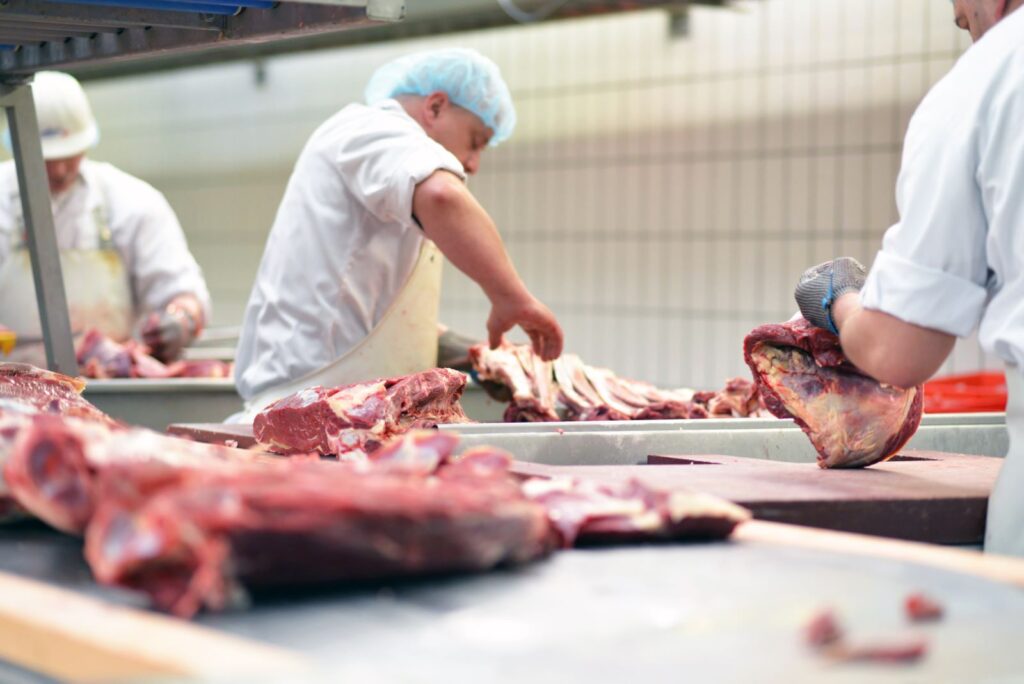Sky-high cost of overseas labour is fuelling food price inflation, BMPA says
14th July 2023
Companies in the British meat industry are having to pay £10,000-£15,000 in one-off costs to source workers from as far afield as Asia, pushing up food prices, as labour shortages continue to be a major challenge for the sector, the British Meat Processors Association (BMPA) has revelaed.
While UK meat processors would like to fill vacancies with local workers, this is often challenging as many people are physically unable to take on the jobs or travel to the workplace. Therefore, employers are forced to recruit labour from overseas at extortionate costs, which comes in addition to a near 20% rise in wages.
According to Nick Allen, CEO of the BMPA, two of the Association’s members have spent a combined £10 million in the last 18 months to bring in staff from abroad due to a lack of suitable candidates in the UK.
“It’s an extra cost on top of wages that we never had before we left the EU,” he said.
“And to stay viable, these costs are having to be passed on to consumers, stoking food price inflation, and making British companies less competitive.”
Compounding the situation, chief secretary to the Treasury John Glen has recently announced the following increases to migrant visa fees that is intended to raise revenue to cover public sector pay increases:
- Immigration Health Surcharge – up over 65% from £624 to £1035
- Work and visit visas – up 15%
- Certificates of sponsorship, settlement, citizenship – up “at least 20%”
Since employers will have to take on the extra cost in order to incentivise workers to come to the UK, this will further inflate the price of goods and services produced by overseas workers, Mr Allen pointed out.
In the event that the extra charges are borne by the workers themselves and not by their employer, the UK will become much less attractive as a destination for overseas talent, further exacerbating the labour crisis.
Overseas workers a necessity
Mr Allen went on to highlight that meat processing is one of those industries that struggles to recruit and retain workers from the local population.
“It’s an inconvenient truth, but many British workers, whether they’re ‘economically inactive’ or not, are either reluctant or physically unable to take up jobs in certain industries.
“This is partly a perception issue, but the bigger and more intractable issue is the lack of geographical mobility and the physically challenging working environment, neither of which we can change, either for productivity reasons or for food safety reasons.”
The difficulties British meat processing and other industries have been having to obtain government support for an optimal skills and labour supply are highlighted in two recently published reports.
On the one hand, the Independent Review into Labour Shortages in the Food Supply Chain emphasizes the need to allow more skilled and semi-skilled migrant workers into the country to take up vacancies that can’t be filled from the domestic labour supply. The BMPA supports the review’s pragmatic approach and recommendation that government works more closely with industry.
On the other hand, the twenty-five-strong ‘New Conservatives’ group of MPs has recently released a report calling for it to be made much harder to source the people and skills the industry needs.
Having recognised that the answer lies somewhere between short term reliance on overseas workers and a longer-term shift in how this country perceives and values certain careers, the BMPA is calling on schools, education providers and the government to take action and help put an end to the labour crisis.

